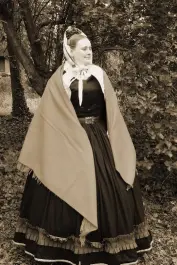From Moore’s Rural New-Yorker in Rochester, NY
March 19th, 1864
The Unprotected Female
Editors Rural New-Yorker: – Here are a few thoughts, suggested by reading a part of a letter in the fourth number of the Rural, signed M.J.C. She says: – “The unprotected female, sitting among her boxes and bundles in some bustling depot, is, or ought to always to be, the subject of interest. Made up as she is, of nerves, inefficiencies, headaches, cold feet, anxiety and skepticism, she has a title clear, my dear sir, to you candid opinion, as to whether the cars are moving east or due west, or even to express her conviction that they are stationary and surrounding objects are marching on.”
“The unprotected female!” Will M.J.C. please tell us why a female, unprotected, should demand any more interest or sympathy than an unprotected male? Has not her Creator endowed her with the same instinct for self-protection, and given her reason to guide it? Has He not bestowed upon her the same number of limbs for purposes of locomotion, and given her two hands with which to provide for her wants, and protect herself, the same as he has the male?
“Sitting among her boxes and bundles.” What business has a woman to load herself, or any one else, with such rubbish? It is that she may keep two or three men standing, while she has the satisfaction of seeing said boxes and bundles occupying the seats which, by right, if not by custom, belongs to them? I agree that a woman thus situated ought always to be the subject of kindly interest, – so had a man who carries with him such an unmistakable evidences of an unsound mind. Who can look at woman through the clear glasses of reason, instead of the colored ones of fashion, and not see that she is deficient in either education or independence. Her appearance clearly denotes hat she is an object slave, who is either ignorant of the fact, or considers it an honor that she is such, and is unwilling to appear, at least before strangers, unless surrounded by unmistakable evidences of her servitude. If she goes from home for a visit of a few days, she needs a baggage wagon to carry what she deems necessary for the display of her master’s power.
If she is compelled to carry anything in her hands she is really to be pitied, for women, clothed as this class are, have not even one hand that they can properly claim for any use except to guard their badges from injury. They are arrayed in a manner that makes it actually unsafe for them to enter or leave a car or carriage, unless they have both hands free to prevent their skirts from being caught by one of the projections that seem made expressly to torment poor women – or being entangled by the feet of their fellow travelers. Why, unless they are proud of their servitude, will they consent to be thus shackled, while men go about unencumbered? Their hands are free, never being required to keep their clothes from dragging on the dirt, or being trodden upon by the feet of their companions. Their “boxes and bundles,” even for a long journey, are all stowed in one satchel or valise which they can easily carry in one hand, thus leaving the other free to grab the hand of a friend, or assist some unprotected female who has ventured from home to spend a few days, but is already wishing she was back again; for how is she to change all this baggage from the depot to the cars without breaking her neck or tearing her dress?
“Made up as she is, of nerves, headaches, cold feet, anxiety and skepticism.” Poor things! How much suffering is combined in this sentence. Yet who of the sufferers will allow even their best friends to tell them why they are thus made? I will write [sic] although I will admit that I have not a friend who suffers from these afflictions that I should dare to speak my mind freely to, lest they should consider me an enemy to right, because they consider these an affliction of Providence which it would be sacrilegious to see to escape.
Women have no more “nerves” than men, and they would be no more nervous, where their bodies as healthy, and their nerves a little less taxed by petty cares and little accidents. As to “inefficiencies,” supposed you try the experiment of dressing a strong man in trailing skirts, well extended by hoops! Pin his waist so tight as to prevent his stooping with ease, and only allowing him the use of the upper portion of his lungs. Then oblige him to look after the many boxed and bundles that we unprotected females are required, by fashion, to be encumbered with, and see who is the most inefficient! I would pronounce him a model of patience if he did not swear at the many hindrances and annoyances that he would be subjected to on account of his change of clothing, and consequent baggage.
“Headaches and cold feet” are two severe afflictions; the former generally caused by the latter by imporoper dress in the majority of cases. I have never seen a woman yet, who had not broken out of fashion’s train entirely, that did not dress her feet and lower limbs too thin, her hips too warm, her waist too tight, and carry suspended from her waist, weights, varying according to the season and the caprices of the wearer, from two to fifteen pounds. All these things aid in destroying the circulation of the blood, and the action of all the organs of the body.
That the present suffering of women is a punishment for their sin, I fully believe; but it appears to me that nothing but genuine stubbornness can prompt a continuation of the sins which we know have brought upon us such just suffering. Men, being clothed in substantial goods, made in a manner that allows them the free use of their bodies, and protects them from the cold, do not suffer these many severe afflictions, that are the bane of our lives; except such as they inherit. It would seem that after any class of beings, endowed with reason, had become so enfeebled as the women of the present have, that they would strive in every way possible, to regain their natural powers of body and mind. To do this, the first step should be to adopt a dress that would give perfect freedom to mind and body, instead of one that cripples and deforms the latter, while it exhausts the former to keep it in a condition that will be considered by the rulers as acceptable.
“Anxiety and skepticism” are but attendant evils that will vanish when their causes are removed, which will be when women are not ashamed to be clothed in a manner that will insure them warmth and freedom. I do not believe that there is a woman living in the United States who has reached her sixteenth year, and dressed for the last three years with the least regard to the dictates of fashion, that, when dressed, even loosely, can draw a natural breath at the first trial.
Will women ever learn to consider their bodies as only the dwelling place of their souls, where they are to be fitted for the world to come? If they ever do, we shall cease to hear so much prating about the inferiority of women, and her need of protection. She will then be safe travel anywhere among Christian people unprotected, and will not need “your candid opinion, my dear sir, as to whether the cars are moving east or due west,” and as to “expressing her conviction that they are stationary and surrounding objects marching on,” she will be no more apt to make such expressions then than men will. I have heard many, who call themselves ladies, make remarks that were quite as sensible as that would be; but I consider that their greatest ignorance consisted in no knowing that it is a disgrace for even a lady to be ignorant. Amanda Roberts Keyser. Pekin, February, 1864
















